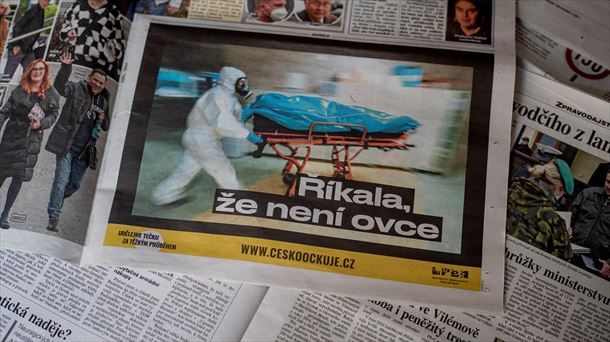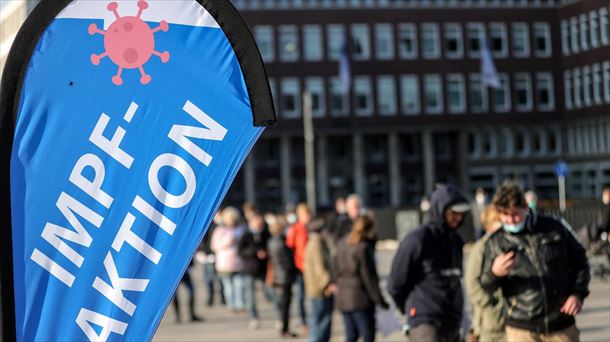Central and eastern Europe now have some of the highest numbers of infections. The Netherlands has ordered the closure of establishments to be advanced, Denmark will require the vaccination certificate to enter certain installations and Germany has been in favor of tightening measures.
The center and east of Europe now has some of the highest numbers of infections, hospitalizations and mortality from covid-19, as well as the lowest for immunization in the EU, a situation in which several governments apply measures and restrictions to the unvaccinated to convince them to do so. do.
From the Czech Republic to Bulgaria and from Austria to Romania, absolute maximums have been reached in recent days since the pandemic began and in some countries the hospital system is, once again, on the verge of collapse.
Health authorities in countries such as Austria and the Czech Republic insist that the vast majority of those newly infected and hospitalized are not vaccinated.
In Austria, the Executive’s reaction to the uncontrolled outbreak of cases and hospitalizations, although not yet deaths, focuses on pressing for the 35% of the population that has not been vaccinated to do so as soon as possible.
The Austrian Government today expressed its intention to approve this Sunday a confinement for those who have not been vaccinated or have had the disease, a measure that it wants to negotiate first with the nine federal states of the country.
In Czech Republic, the Ministry of Health has launched a harsh media campaign in which it shows photos of real patients in critical situation and of corpses being placed in coffins, under labels such as “he thought he still had time” or “she does not believe in the vaccines”.
Only 57.5% of the total population of the Czech Republic is fully immunized against covi-19.

Detail of the campaign of the Czech Ministry of Health. Photo: EFE
In Slovakia, the pressure to increase the level of vaccination, currently at 42%, has come to the Executive to announce that workers who are not vaccinated, have not had the disease or do not have a recent test will stop receiving their salary.
In bulgariaHowever, which has the highest death rate from covid-19 in the EU and that this weekend it is holding legislative and presidential elections, recourse to confinement has been ruled out.
Since last October 21, the covid certificate is required, of being vaccinated, healed or having a recent negative test, to access gastronomy or culture venues. Since then, the rate of vaccination has accelerated, but it remains below 23% of the total population.
In romania, the second country in the EU with the lowest rate of vaccinated and the second also with the highest mortality, since October 25, the unvaccinated have been prohibited from consuming in bars and restaurants and cannot leave their homes between ten o’clock at night and five in the morning the next day.
The government of Netherlands today ordered the closing of non-essential stores to be brought forward at 6:00 p.m. and hotels, supermarkets and pharmacies at 8:00 p.m. to stop the cases of covid-19, the day after registering the highest figure of contagions since the beginning of the pandemic, in March 2020.
The Netherlands today registered 16,287 infections in the last 24 hours, almost the same as last Thursday, when the highest figure since the start of the pandemic was reached with 16,364 cases. The incidence is 93.2 infections per 100,000 inhabitants.
Citizens of Denmark They will have to present the vaccination certificate against covid-19 from this Friday to enter certain facilities, such as bars or restaurants, given the increase in infections and two months after having lifted all the restrictions imposed by the pandemic.

A queue of people outside a vaccination center in Duisburg (Germany). Photo: EFE
The acting German Government has today been in favor of tightening measures in Germany given the rapid increase in infections with almost daily absolute peaks.
The acting Minister of Health, Jens Spahn, has described the situation in the country as “serious”, where today a new maximum has been registered with a cumulative incidence in seven days of 263.7 new infections per 100,000 inhabitants, “with high numbers and a low infection rate “.
Meanwhile, the vaccination rate remains practically stagnant, with 70% of the population vaccinated as of Wednesday, 67.4% with the full schedule.
Kingston is an accomplished author and journalist, known for his in-depth and engaging writing on sports. He currently works as a writer at 247 News Agency, where he has established himself as a respected voice in the sports industry.












